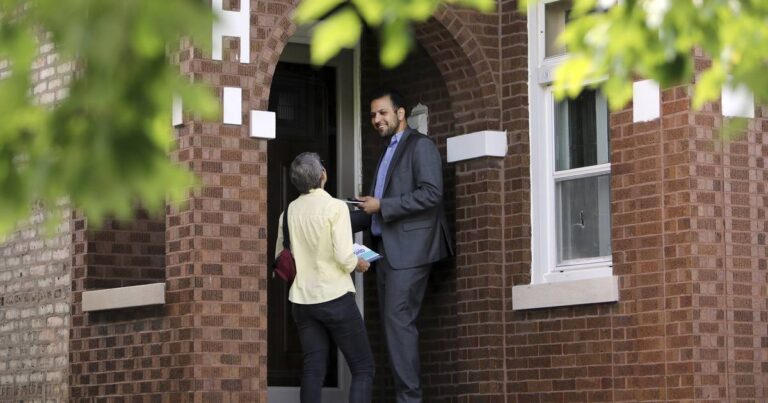Clout was not king in Tuesday’s primaries for Illinois General Assembly seats, and establishment politicians are bracing for a potentially wild ride heading into November’s general election.
While Democratic-drawn district boundaries played favorably in last week’s election for many party members, high-profile losses by incumbents and well-funded candidates from both parties appeared to be fueled by an anti-establishment strain coursing through the electorate that could be amplified by November.
Advertisement
The resounding defeat of Richard Irvin, a Republican candidate for governor who had $50 million from billionaire Ken Griffin in his campaign pocketbook, is just one example.
But more telling is what happened in some state legislative races. Perhaps no race exemplified voters’ willingness to go their own way than the five-way Democratic primary contest to replace retiring Illinois House Majority Leader Greg Harris on Chicago’s North Side.
Advertisement
The undisputed candidate of establishment Democrats was social worker and community activist Eileen Dordek. Gov. J.B. Pritzker knocked on doors for her, and she raised $278,000 with help from a teachers union, law firms, ward organizations and the political funds of elected officials, according to an analysis by campaign finance expert Kent Redfield. In addition to Pritzker’s backing, she collected a bevy of endorsements from popular politicians.
In the end, voters didn’t go along with the mainstream party’s attempted political anointment.
Instead, they chose political newcomer Hoan Huynh, whose primary victory in a solidly Democratic district — one with a substantial Asian population — virtually assures he will become the first Vietnamese American elected to the Illinois General Assembly.
The first primaries after the once-every-10-years state and federal redistricting are traditionally bumpy, particularly for the party out of power, and a few incumbents inevitably fall.
This year’s rare June primary also was influenced by low voter turnout, a growing voter dissatisfaction of government and political baggage for several Democrats tied to ex-Speaker Michael Madigan, the longtime party leader indicted on corruption counts in March.
But a combination of high gas prices, inflation, rising crime, low favorability ratings for Democratic President Joe Biden and some voters’ extreme loyalty to Republican ex-President Donald Trump, along with the U.S. Supreme Court’s decision to overturn Roe v. Wade, make it likely the November election will be just as tumultuous for party regulars.
The top-of-the-ticket match-up between Pritzker, who has made reproductive rights central to his campaign, and Republican Darren Bailey, who has Trump’s endorsement and opposes abortion in all cases except to spare the life of the mother, figures to generate the most heat.
“The intensity is going to remain, given the the prominence social issues will play in this election, especially abortion,” said one longtime Democratic strategist who asked not to be named because he did not have permission from a campaign to speak on the record.
Advertisement
Irvin’s loss may not be the best barometer of voter sentiment, given that in addition to his financial backing from Griffin, Pritzker injected tens of millions of Democratic dollars into the race in an effort to undercut Irvin and lift Bailey, an opponent the governor sees as weaker in the fall.
Sign up for The Spin to get the top stories in politics delivered to your inbox weekday afternoons.
To get a better feel of what is happening at ground level, longtime observers are tuning into Illinois House and Senate races.
“This is how politics is working at the local level,” Redfield said. “These are the forces and the dynamics that filter up.”
In the race to replace longtime Rep. Harris, Huynh got a notable endorsement from state Rep. Theresa Mah, who represents Chinatown.
Mah’s legislative seat is a product of years of struggle to put Chinatown in a single district instead of having it split into as many as four Illinois House districts and three Illinois Senate districts that for years were held by lawmakers without obvious racial or ethnic connections to Chicago’s tightknit Chinese community.
Advertisement
In the 2016 Democratic primary, Mah defeated the son of former state Rep. Edward Acevedo, once a member of Madigan’s leadership team who earlier this year pleaded guilty to tax evasion charges in an outgrowth of the ComEd probe.
Mah said Huynh’s primary victory demonstrated the ability of a strong ground game to overcome an opponent with a bigger bank account and big-name endorsements. Huynh raised $210,000, records showed, including $57,000 from Mah’s political committee.
Candidates like Huynh, who was born on a refugee base in Vietnam, immigrated to the U.S. with his family in the early 1990s and went on to an Ivy League education, can connect with voters, particularly those in underrepresented communities, Mah said.
“We see the top line with the amount of money raised and the highest-profile endorsers, we think that that’s going to determine who wins,” Mah said. “But here we saw an example of how the people had a lot of power and the grassroots were such an incredible influence on this campaign.”
Huynh said dozens of languages are spoken in the district, and he and his campaign volunteers distributed political literature in English, Spanish, Russian, Ukrainian, Chinese, Hindi, Vietnamese and Amharic–which is spoken in Ethiopia–all moves that helped capture first-time voters.
Huynh said he sought to “bring people from all walks of life into the campaign,” an effort that encompassed reaching out to not only immigrants but veterans, young voters, seniors and members of the LGBTQ+ community.
Advertisement
“We had a message that resonated with voters. We knew the pandemic exacerbated inequalities,” Huynh said, adding: “We have to build a much more inclusive future for everyone.”
Another anti-establishment vote was seen in the southwest suburban contest for the seat long held by Rep. Mike Zalewski. The Riverside Democrat lost to Abdelnasser Rashid of Justice, who was backed by Our Revolution Illinois, an outgrowth of progressive backers of U.S. Sen. Bernie Sanders.
“These are real victories of people trying to fight in their own best interest,” said Clem Balanoff, chairman emeritus of Our Revolution and a former Democratic state representative. “They worked together, and they knocked on doors.”
Zalewski had the support of House Speaker Emanuel “Chris” Welch, but some Democrats have privately grumbled that Welch spent too much time making sure his wife, ShawnTe Raines-Welch, won her primary for a judgeship and lost sight of his three incumbents in tight races.
Current House Democrats kicked in a total of $190,000 to Raines-Welch’s successful campaign for a judicial subcircuit post, a figure that included $185,000 from members of Welch’s leadership team.
Welch, whose predecessor went all in to elect his daughter attorney general, defended his wife during the campaign as “exceptionally qualified” and said there was “nothing unethical or illegal” about the giving.
Advertisement
Zalewski raised more than $1 million during the primary period starting in January 2021, including $280,000 from labor, $74,000 from Welch’s caucus committee and $55,000 from Pritzker’s funds.
His bankroll overwhelmed Rashid’s total of just $383,000, which included $60,000 from his family and no easily identifiable contributions from labor and professional organizations nor the political funds of elected public officials, according to Redfield’s analysis.
Democratic and Republican insiders both made a strong case that Welch is less to blame for Zalewski’s defeat than the fact he no longer was protected by Madigan’s once-mighty Democratic organization.
In another example of that dynamic, James Gleffe, a longtime foot soldier in Madigan’s organization, was obliterated in a primary race for judge despite backing from unions, public officials and Madigan loyalists including 13th Ward Ald. Marty Quinn.
Zalewski, a Madigan loyalist who chaired the powerful House Revenue and Finance Committee, also suffered from an even closer connection to the ComEd scandal. His father, former 23rd Ward Ald. Mike Zalewski, allegedly took a contract from the utility that required little or no work. Neither Zalewski has been accused of any wrongdoing.
On top of the Madigan issue, Rashid ratcheted up attacks on Rep. Zalewski over his vote to keep in place a law that minors should notify parents before an abortion, a state requirement eliminated under Pritzker.
Advertisement
Another incumbent Democrat, Rep. Kathy Willis, of Addison, also faced campaign challenges because of her relationship to the former speaker. Unofficial vote totals have Willis trailing challenger Norma Hernandez, a Triton College trustee from Melrose Park, by around 200 votes with final mail-in ballots yet to arrive. Hernandez claimed victory on the seat on Tuesday night and The Associated Press declared the race for her, but Willis on Friday said she’s not ready to concede.
“I’m in a holding pattern,” she said.
Madigan plucked Willis out of relative obscurity a decade ago when the then-speaker set his sights on taking out Rep. Angelo “Skip” Saviano, the Elmwood Park Republican whose relationship with Madigan had shifted from one of mutual tolerance to downright frosty. Willis had voted Republican in numerous primaries before she ran with Madigan’s backing as a Democrat and won.
Eventually, Madigan named Willis to his leadership team, making her caucus chair. But she turned on Madigan and became part of a bloc of 19 mostly female Democrats who refused to support his reelection as speaker in January 2021 amid the burgeoning ComEd scandal.
Willis raised $330,000 in the primary period, including $100,000 from war chests of some elected officials and $63,000 from a pro-Democratic House committee fund, according to Redfield’s analysis. But Hernandez raised nearly as much, $310,000, drawing $133,000 from her own set of supportive elected officials and $120,000 from labor groups unhappy with Willis for rebelling against Madigan.
In an interview before the primary, Willis maintained House Democrats backed each other under Madigan, who moved money from lawmakers who were unopposed or facing nominal challengers to shore up more vulnerable members.
Advertisement
Under Welch, though, House Democrats have been encouraged to take a more active role in their own fundraising, Willis said, adding that she had no problems with the shift in strategy.
A third House Democratic incumbent backed by Welch, freshman Rep. Denyse Wang Stoneback, lost to fellow Skokie resident Kevin Olickal. She outraised Olickal $285,000 to $204,000. Her donations included $58,000 from Welch and House Democratic committees.
House Democratic incumbents have lost their seats in previous redistricting years, even with Madigan at the party’s helm. House Republican leader Jim Durkin of Western Springs also lost some incumbent members.
Reps. David Welter of Morris, a member of Durkin’s leadership team, and Mark Luft, the former mayor of Pekin, both were defeated by more conservative opponents. Welter’s opponent, Jed Davis of Newark, was helped by Bailey, who appeared in the district several times on his behalf.
In the Senate, President Don Harmon of Oak Park saw appointed Sen. Eric Mattson of Joliet, who raised more than $800,000, mostly from the Senate Democratic fund, labor and other elected officials, go down in defeat. Mattson lost big to progressive challenger Rachel Ventura of Joliet, a former congressional candidate who raised slightly more than $40,000.
The voter’s “anti-everything” mood this election season has been palpable to former Democratic state Sen. Lou Viverito, who is in his 49th year as Stickney Township supervisor.
Advertisement
“I’ve never seen so much unrest,” Vivierto said. “I’ve never seen people feel more insecure than they are right now.”
“Nothing is going to change in the next few months.”







